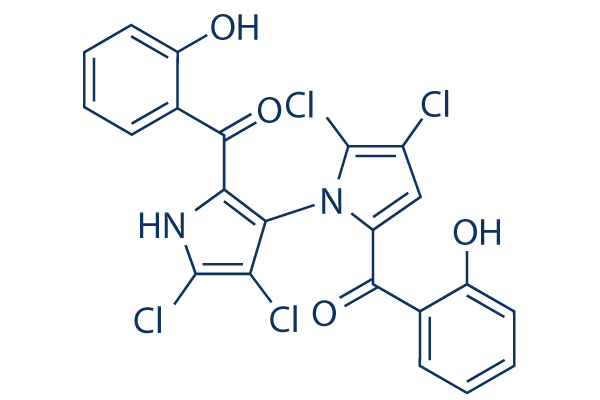| Cas No.: | 1227962-62-0 |
| SMILES: | OC1=CC=CC=C1C(C2=C(N3C(C(C4=CC=CC=C4O)=O)=CC(Cl)=C3Cl)C(Cl)=C(Cl)N2)=O |
| Formula: | C22H12Cl4N2O4 |
| M.Wt: | 510.15 |
| Purity: | >98% |
| Sotrage: | 2 years -20°C Powder, 2 weeks 4°C in DMSO, 6 months -80°C in DMSO |
| Description: | In vitro: Maritoclax induces Mcl-1 degradation via the proteasome system, which is associated with the pro-apoptotic activity of maritoclax. Maritoclax selectively kills Mcl-1-dependent, but not Bcl-2- or Bcl-XL-dependent, leukemia cells and markedly enhances the efficacy of ABT-737 against hematologic malignancies, including K562, Raji, and multidrug-resistant HL60/VCR, by ∼60- to 2000-fold at 1-2 μM. Maritoclax blocks the interaction between a biotin-labeled Bim-BH3 peptide and GST-Mcl-1 in a dose-dependent manner with an IC50 value of 10.1 μM, while it does not inhibit the binding of Bim-BH3 peptide to GST-Bcl-XL at concentrations up to 80 μM. Maritoclax induces caspase-3 activation by degradation of Mcl-1 protein. Treatment with maritoclax markedly reduces the half-life of Mcl-1 to ∼0.5 h as compared with nearly 3 h in control cells. Maritoclax has no apparent effect on Mcl-1 (Ser159/Thr163) phosphorylation, suggesting that maritoclax induces phosphorylation-independent Mcl-1 degradation. Marinopyrrole A has potent concentration-dependent bactericidal activity against clinically relevant hospital- and community-acquired MRSA strains. Marinopyrrole A shows limited toxicity to mammalian cell lines (at >20× MIC). Maritoclax sensitivity is cell type specific. It is not effective in HeLa, HEK293, or MEF cells. Maritoclax is not a substrate for p-gp mediated drug efflux. In vivo: Maritoclax administration at 20 mg/kg/d intraperitoneally causes significant U937 tumor shrinkage, as well as 36% tumors remission rate in athymic nude mice, without apparent toxicity to healthy tissue or circulating blood cells. |

 To enhance service speed and avoid tariff delays, we've opened a US warehouse. All US orders ship directly from our US facility.
To enhance service speed and avoid tariff delays, we've opened a US warehouse. All US orders ship directly from our US facility.




















